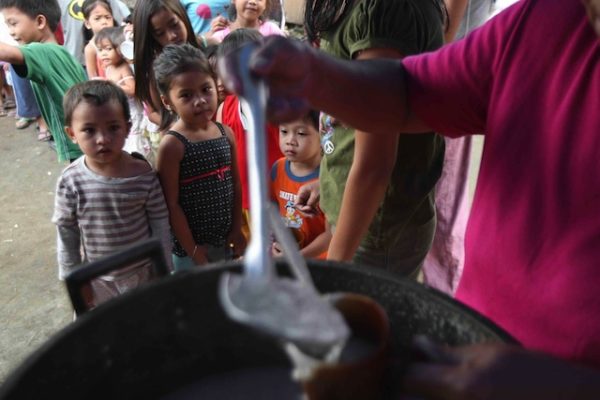1 in 3 Filipino kids still malnourished, stunted – study
April 19, 2017 · By Patty Pasion for www.rappler.com
The study also notes that 20% of kids under 5 years old die due to poor health services

SATIATING HUNGER. Children wait their turn at a feeding program for informal settlers in Quezon City. File photo by Rolex dela Peña/ EPA
MANILA, Philippines – Poor nutrition remains a major problem in the Philippines with 3.4 million children found to be stunted and over 300,000 underweight – all under 5 years old.
A study released by the Inter-Agency Regional Analyst Network (RAN) and the Action Against Hunger (ACF) said these figures are alarming, given the growing economy of the Philippines.
Titled “Socio-economy of Chronic Malnutrition in the Philippines: A preliminary key trends analysis by 2030”, the study noted that several theories have established that “higher incomes automatically improve the access to food.”
“A relatively modest increase in GDP per capita could – or should – significantly improve a range of social progress indicators,” it added.
But the Philippines, the 9th among the countries with the highest prevalence of stunted kids, has had slow progress in addressing the issue.
From a prevalence rate of 38% in 1998, the decrease has not been consistent, only reaching 30% in 2013 based on the estimates of United Nations (UN) agencies. (READ: Addressing malnutrition, one meal at a time)
Based on Food Nutrition and Research Institute (FNRI) data as of 2015, stunting or the chronic malnutrition rate among children is now at 33.4%.
Lower-income countries like Vietnam and Cambodia are even faring better than the Philippines. Only 23% of children are stunted in Vietnam while 32.9% are affected in Cambodia.
The Philippines’ disturbing figures, the study said, are expected to shoot up by 2030 if government does not boost support for social services.
According to the study, 20% of deaths among children under 5 years old are due to poor health services.
Focus on factors
“Our call for the new administration of President Rodrigo Duterte is to commit and invest in nutrition as well as hold nutrition stakeholders accountable to meet targets to reduce child stunting and wasting, and strengthen and sustain the political will to address malnutrition as a crucial concern of development,” said Action Against Hunger Philippines country director Javad Amoozegar.
The study suggests that the government focus on the root causes of chronic malnutrition, such as poverty.
Children born from mothers with poor nutritional status before and during pregnancy have a low birth weight (LBW) – a likely determinant of stunting. (READ: The challenge in ending poverty by 2030)
Stunting is also pronounced in informal settlements which do not have access to safe water and sanitation.
Ensuring education and local employment for women, who are eventually going to be mothers, is also key to reducing malnutrition in the long run.
Work opportunities for mothers, preferably near their homes or within the country, is associated with fighting malnutrition since child feeding routines may be affected if mothers are away. (READ: How much can you save when you breastfeed?)
“Long distances to work and irregular working shifts thus tend to be associated with suboptimal feeding practices,” the study said, adding that overseas employment forces mothers to pass the role of taking care of children to other members of the family.
Stunting, if not addressed, affects the physical and mental development of a child – consequences that are irreversible when a child reaches the age of two.
Citing a World Bank report, the study said “that a 1% loss in adult height as a result of childhood stunting is linked with a 1.4% loss in economic productivity, making them earn 20% less as adults.” – Rappler.com






